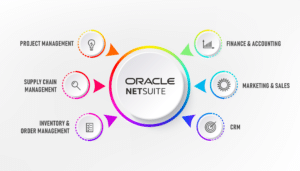Oracle NetSuite ERP, often referred to simply as NetSuite, is a cloud-based Enterprise Resource Planning (ERP) software solution offered by Oracle Corporation. NetSuite is designed to help businesses of all sizes manage their core business processes, including financial management, customer relationship management (CRM), e-commerce, and more, in a unified and integrated platform. Here are some key aspects and features of Oracle NetSuite ERP:

1.Cloud-Based
NetSuite is a true cloud ERP system, meaning it operates entirely in the cloud. Users can access the software and their data from anywhere with an internet connection, eliminating the need for on-premises servers and infrastructure.
2.Comprehensive Suite
NetSuite offers a wide range of integrated modules that cover various business functions. These modules include financial management, inventory management, supply chain management, CRM, e-commerce, human resources, and more. The integrated nature of NetSuite allows data to flow seamlessly between different parts of the business.
3.Financial Management
NetSuite’s financial management module includes features such as general ledger, accounts payable and receivable, budgeting, and financial reporting. It helps businesses maintain accurate financial records, manage expenses, and make informed financial decisions.
4.Customer Relationship Management (CRM)
NetSuite provides a robust CRM system that helps businesses manage customer interactions, sales, and marketing campaigns. It allows for a 360-degree view of customer data and supports lead management, opportunity tracking, and customer support.
5.E-Commerce
or businesses involved in online sales, NetSuite offers e-commerce capabilities that enable companies to create and manage online stores. It supports features like product catalog management, shopping cart functionality, and order processing.
6.Inventory and Supply Chain Management
NetSuite helps businesses optimize their inventory levels, streamline order fulfillment, and improve supply chain visibility. It includes tools for demand planning, order management, and procurement.
7.Customization
NetSuite is highly customizable, allowing businesses to tailor the software to their specific needs. Users can create custom fields, forms, and workflows to match their unique business processes.
8.Real-Time Analytics
NetSuite provides robust reporting and analytics tools, including customizable dashboards and financial reporting. Users can generate real-time reports, analyze data, and gain insights into business performance.
9.Scalability
NetSuite is suitable for businesses of various sizes, from small startups to large enterprises. It can scale to accommodate changing business needs and increased transaction volumes.
10.Security and Compliance
NetSuite prioritizes data security and compliance with industry regulations. It includes role-based access controls, encryption, and audit trails to protect sensitive business data.
11.International Capabilities
NetSuite supports multi-currency and multi-language functionality, making it suitable for businesses with global operations.
Oracle NetSuite ERP is known for its flexibility, scalability, and the ability to support businesses in various industries. Its cloud-based approach simplifies deployment, reduces IT infrastructure costs, and allows organizations to focus on their core operations while leveraging modern technology to improve efficiency and competitiveness.
Considerations for Implementing Oracle NetSuite ERP
Successful implementation of Oracle NetSuite ERP requires careful planning and consideration of various factors:
- 1. Data Migration: Transferring existing data to Oracle NetSuite is a critical step. Businesses must ensure that data migration is accurate and that historical data is preserved for reporting and compliance purposes.
- 2. Customization: While Oracle NetSuite is highly configurable, businesses should assess whether the level of customization provided meets their specific needs. Customization can affect the cost and timeline of implementation.
- 3. Integration: Evaluate how Oracle NetSuite will integrate with other tools and systems your organization uses, such as CRM software, legacy applications, or third-party services. Smooth integration enhances workflow efficiency.
- 4. User Training: Adequate training for users is essential to maximize the benefits of Oracle NetSuite ERP. Investing in user training ensures that employees are proficient with the software and can use it effectively.
- 5. Data Security and Compliance: Understand Oracle NetSuite’s security measures and compliance certifications. Ensure that the system aligns with your organization’s data security and compliance requirements, especially if you operate in regulated industries.
- 6. Service Level Agreements (SLAs): Review SLAs with Oracle to ensure they meet your expectations for system availability, support response times, and data backup and recovery procedures.
- 7. Scalability: While Oracle NetSuite is scalable, it’s essential to plan for future growth and assess whether the chosen configuration can accommodate increased demand and additional users.
- 8. Change Management: Implementing ERP software often requires changes in business processes and workflows. A well-defined change management strategy can help employees adapt to new ways of working.
- 9. Vendor Expertise: Consider engaging with experienced Oracle NetSuite consultants or partners who can provide guidance during implementation. Their expertise can help streamline the process and address specific industry needs.
- 10. User Feedback: Collect feedback from end-users during and after implementation to identify any issues, areas for improvement, or additional training needs. Continuous feedback ensures that the ERP system aligns with user requirements.
- 11. Total Cost of Ownership (TCO): While Oracle NetSuite offers cost savings compared to on-premises ERP solutions, businesses should calculate the TCO over the long term, including subscription fees, training, and any additional services required.
- 12. Alignment with Strategic Goals: Ensure that the implementation of Oracle NetSuite aligns with your organization’s strategic goals and objectives. It should support your long-term growth and competitiveness.
Conclusion
Oracle NetSuite ERP is a powerful and flexible solution that can drive efficiency, productivity, and growth for businesses. However, a successful implementation requires thorough planning, attention to detail, and collaboration among stakeholders. By considering the factors mentioned above and investing in careful implementation and user training, businesses can fully leverage the capabilities of Oracle NetSuite ERP to achieve their operational and strategic objectives.